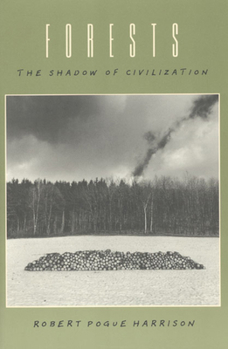Forests: The Shadow of Civilization
Select Format
Select Condition 
Book Overview
In this wide-ranging exploration of the role of forests in Western thought, Robert Pogue Harrison enriches our understanding not only of the forest's place in the cultural imagination of the West, but also of the ecological dilemmas that now confront us so urgently. Consistently insightful and beautifully written, this work is especially compelling at a time when the forest, as a source of wonder, respect, and meaning, disappears daily from the earth. "Forests is one of the most remarkable essays on the human place in nature I have ever read, and belongs on the small shelf that includes Raymond Williams' masterpiece, The Country and the City. Elegantly conceived, beautifully written, and powerfully argued, Forests] is a model of scholarship at its passionate best. No one who cares about cultural history, about the human place in nature, or about the future of our earthly home, should miss it.-William Cronon, Yale Review "Forests is, among other things, a work of scholarship, and one of immense value . . . one that we have needed. It can be read and reread, added to and commented on for some time to come."-John Haines, The New York Times Book Review
Format:Paperback
Language:English
ISBN:0226318079
ISBN13:9780226318073
Release Date:March 1993
Publisher:University of Chicago Press
Length:304 Pages
Weight:1.12 lbs.
Dimensions:0.8" x 6.1" x 9.0"
Customer Reviews
4 ratings
For that desert island
Published by Thriftbooks.com User , 17 years ago
When I left to live in the Mexican High Sierra eight years ago, I had room for only four books - ones I could not live without: "Forests" was one of them. Through my many years as a mythologist and therapist, I'd not found any work to equal this fascinating, spiritual exploration into the real and symbolic forest. A long time ago, a student in landscape architecture at the University of British Columbia gave me a copy, requesting my opinion of it. Her wise and sensitive professor had made it required reading for his graduate students, and how many would be astute enough to recognize its importance? Anyone with a true yearning to enter into the dark forest of myth and history, so beautifully explored by Joseph Campbell, will love Harrison's extraordinary revelations from the mythic past to the historical present, and emerge from the woods knowing that it's all part of the same mystery.
The Limits of Civilization
Published by Thriftbooks.com User , 17 years ago
Harrison's book is exquisitely written, filled with both startling and subtle insights about how Westerners since the Greeks and Romans have imagined the nature and role of the wild places that lie always around the far edge of the cleared, cultivated, well-ordered places where civilized humans dwell. Harrison combines philosophy, history, and literature seamlessly. When you are finished reading this book, then read his later equally wonderful book: The Dominion of the Dead.
An important work with appeal to several fields
Published by Thriftbooks.com User , 21 years ago
Although this is clearly a work in literary criticism, it is one that will appeal to those working in other areas. For instance, those working on Environmental Ethics will find a great deal of very information about how forests have been conceived in a great deal of the literature of the greater European world throughout history. Intellectual historians with an interest in how Europeans have conceived nature as a whole will find a great deal to interest them in this book that deals with forests in particular. But the primary audience is students of literature.The narrative of the book runs chronologically to the dawn of written history to Frank Lloyd Wright, though the vast majority of figures discusses are writers, and of those primarily writers of nonfictional literature. Harrison discusses an immense range of writers and works, from the EPIC OF GILGAMESH to Chaucer to Dante to Shakespeare to Descartes to Rousseau to Wordsworth to the Brothers Grimm to Thoreau. Although Harrison's prose style is not exhilarating, I never found the book to be less than interesting.Whether someone will find this interesting will depend on whether they want to know more about the way that forests have been conceived in European history. At various periods of time they have been view as scared, as dark places of fear, as resources for human exploitation, or as ecosystems valuable in their own right. Harrison does not touch upon all these aspects, but I don't think anyone interested in Western attitudes towards nature could help but find this book to be of the greatest help.
luminous
Published by Thriftbooks.com User , 25 years ago
My old Cambridge tutor said that the only works of modern literary criticism he'd sell his shirt for were *Seven Types of Ambiguity* and *The Wheel of Fire*. For a long time I agreed. Then I read *Forests*. It is quite simply the most profound, the most moving, the best-written, the most important work of literary criticism of the late twentieth century.





